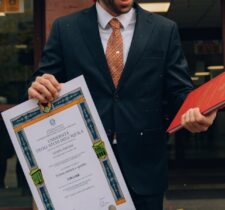Is it illegal to record a conversation in Illinois? This is a question many people ask, especially when considering documenting conversations for legal, business, or personal reasons. Recording laws in the United States can vary widely from state to state, and Illinois has specific rules that are crucial to understand. Violating these laws can lead to serious legal consequences, including criminal charges and civil lawsuits.
In this comprehensive guide, we will explore whether it is illegal to record conversations in Illinois, explain the state’s two-party consent law, outline legal exceptions, and provide best practices for ensuring compliance with the law.
Understanding Recording Laws: One-Party vs. Two-Party Consent
What Is One-Party Consent?
One-party consent means that you can legally record a conversation if you are a participant or have permission from at least one participant. In states with one-party consent laws, you do not need to inform the other party that the conversation is being recorded as long as you are part of it. This is common in many states across the U.S. and allows individuals to document conversations without explicit permission from every participant.
What Is Two-Party (or All-Party) Consent?
Two-party consent, also known as all-party consent, requires that all participants in a conversation agree to the recording. If you are in a two-party consent state, you must inform every person involved in the conversation and obtain their permission before you can legally record it. Failure to do so can lead to legal penalties.
Why Recording Laws Differ Across States
Recording laws are set at the state level, meaning each state has the authority to determine its regulations. Some states prioritize privacy, requiring consent from all parties involved, while others allow for one-party consent to facilitate easier documentation of conversations. Knowing the specific laws in your state is essential to avoid unintended legal violations.
Is It Illegal to Record a Conversation in Illinois?
Illinois as a Two-Party Consent State
Yes, it is illegal to record a conversation in Illinois without obtaining consent from all participants. Illinois follows a two-party consent rule, which means that you must have the permission of every person involved in the conversation before you can legally record it. This applies to both in-person and electronic communications, including phone calls, video chats, and other forms of digital communication.
Under the Illinois Eavesdropping Act, it is illegal to record or intercept private conversations without the knowledge and consent of all parties involved. Violating this law can result in severe penalties, including criminal charges and potential civil lawsuits.
Legal Background of Illinois Recording Laws
The Illinois Eavesdropping Act has undergone several changes over the years. It was initially designed to protect individuals’ privacy by requiring consent from all parties before recording. However, legal challenges led to amendments in 2014 after parts of the law were ruled unconstitutional. The revised law clarifies the requirements for consent and outlines specific scenarios where recording is permissible, emphasizing the protection of privacy while accommodating legitimate needs for documentation.
Exceptions to the Two-Party Consent Rule in Illinois
Recording in Public Spaces
In Illinois, you do not always need consent to record conversations occurring in public places where there is no reasonable expectation of privacy. For instance, if a conversation is taking place on a public street, in a park, or at a busy café, participants might not have a reasonable expectation that their conversation is private. However, caution is advised, as the line between public and private spaces can sometimes be blurred.
Consent Implied by Behavior
Consent can sometimes be implied if the participants are aware of the recording device and continue the conversation. For example, if someone is holding up a camera or voice recorder in plain view, and the participants are aware and proceed with the conversation, it may be interpreted as implied consent. However, relying on implied consent can be risky, and explicit permission is always preferable.
Legal Exceptions for Law Enforcement
Law enforcement officials in Illinois can record conversations under specific circumstances, but they typically require a warrant. If authorities believe that obtaining consent would compromise an investigation, they may be able to intercept communications legally. However, strict guidelines govern when and how these recordings can be made.
Implications of Violating Recording Laws in Illinois
Criminal Penalties
Recording a conversation without the required consent in Illinois can lead to criminal charges. Violations of the Illinois Eavesdropping Act are considered a felony offense, and penalties can include fines, probation, and imprisonment. The severity of the punishment often depends on the circumstances, such as the nature of the conversation and whether the recording was used for malicious purposes.
Civil Lawsuits
In addition to criminal penalties, individuals whose conversations are recorded without consent can file civil lawsuits against the person who made the recording. This means that even if you are not charged criminally, you could still face legal action from the other party, which might result in damages being awarded for invasion of privacy.
Evidence Admissibility in Court
Recordings obtained without proper consent are typically inadmissible in court. If you illegally record a conversation, you cannot use it as evidence in legal proceedings, which means the recording cannot support your case in a dispute. Additionally, presenting illegal recordings in court could further expose you to legal penalties.
Recording Conversations in Different Contexts
Recording Phone Calls in Illinois
The two-party consent rule applies to phone calls in Illinois. Whether you are calling someone within the state or from Illinois to another state, you must ensure that all participants consent to the recording. If the call involves individuals from different states, you must comply with the stricter state law, so it is essential to know the laws in the other state as well.
Recording In-Person Conversations
The same rules apply to face-to-face conversations. If you want to record an in-person conversation in Illinois, you need to inform the other party and obtain their permission before starting the recording. This includes conversations in private spaces, such as homes and offices, as well as in semi-private locations like conference rooms.
Recording Conversations at Work
Recording conversations at work introduces additional legal and ethical considerations. While you may want to document conversations with colleagues or supervisors, doing so without consent can violate Illinois recording laws and your company’s policies. Employers also need to be cautious, as secretly recording employees without consent can lead to legal consequences, including lawsuits and regulatory penalties.
Best Practices for Legally Recording Conversations in Illinois
Always Obtain Consent
The most straightforward way to ensure compliance with Illinois law is to always obtain explicit consent from all participants before recording a conversation. This can be done by asking for verbal or written permission, and it’s a good idea to document this consent in case of future disputes. If the conversation is being recorded for business purposes, consider incorporating consent language into your standard operating procedures.
Be Aware of Location and Context
Understanding the context of where the conversation takes place is essential. While some public settings might allow for more leniency, it’s best to err on the side of caution and assume that consent is required. If you’re unsure whether a setting qualifies as public or private, seek legal advice to avoid potential legal issues.
Understand Interstate Recording Laws
If you are recording a conversation involving people in different states, be aware of how state laws differ. In these cases, the stricter law typically prevails. For example, if you are in Illinois (a two-party consent state) and speaking with someone in a one-party consent state, you should still obtain consent from the other party to comply with Illinois law.
Conclusion
So, is it illegal to record a conversation in Illinois? Yes, it is if you do not obtain consent from all parties involved. Illinois follows a two-party consent rule, which means you need permission from every participant before you can legally record. Violating this law can lead to severe criminal penalties and civil lawsuits, and illegally obtained recordings cannot be used as evidence in court. Always make sure to understand and follow state recording laws to avoid unintended legal consequences.
If you are unsure about whether you can legally record a conversation, consult with a legal professional who can provide guidance specific to your situation.
FAQ’s
Q1: Can I record a conversation in Illinois without telling the other person?
- No, Illinois law requires consent from all participants before a conversation can be recorded. Recording without this consent is illegal and can lead to criminal charges.
Q2: What are the penalties for illegally recording a conversation in Illinois?
- Violating the Illinois Eavesdropping Act can result in criminal charges, including fines and imprisonment, as well as potential civil lawsuits for damages.
Q3: Can I record my boss or colleagues at work without their knowledge?
- No, recording conversations at work without consent violates Illinois law and may also breach company policies, leading to legal and disciplinary consequences.
Q4: Are recorded phone calls admissible in court in Illinois?
- Only legally obtained recordings are admissible in court. Recordings made without proper consent cannot be used as evidence and may expose you to further legal issues.
Q5: Does Illinois law apply if I am recording a conversation with someone in another state?
- When recording conversations across state lines, you must comply with the stricter state law. Since Illinois requires two-party consent, you should obtain permission from all participants even if the other state allows one-party consent.







